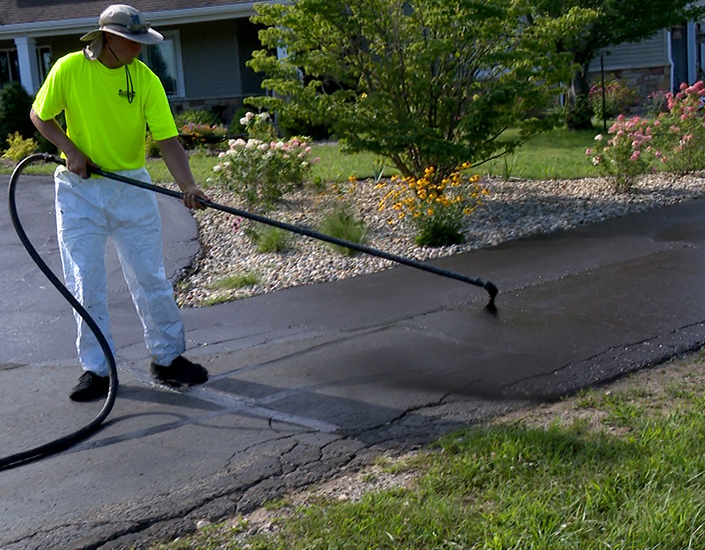Unleash the Potential: Regrading and Asphalt Sealing for Commercial Rooms
Warm Mix Asphalt: A Sustainable Service for Sidewalk
Warm Mix Asphalt (HMA) has actually emerged as a leading sustainable choice for sidewalk services, supplying a myriad of environmental benefits and cutting-edge technologies. Its capacity to reduce and reuse materials energy consumption offers an engaging case for its adoption in roadway building and construction jobs. The long-lasting efficiency and longevity of HMA make it a favored alternative for facilities advancement. As the need for green construction methods grows, exploring the nuances of HMA's sustainability can provide important insights into the future of sidewalk remedies.
Ecological Advantages of Hot Mix Asphalt

In Addition, Hot Mix Asphalt helps to reduce city warm island effects. Its dark color soaks up sunshine, decreasing the amount of warm reflected back right into the atmosphere contrasted to lighter-colored sidewalks. This can reduce ambient temperatures in city locations, lowering the need for cooling and inevitably lowering energy intake.
On top of that, Warm Mix Asphalt contributes to boosted stormwater monitoring. Its permeable nature allows water to infiltrate the pavement and charge groundwater supplies, minimizing overflow and the danger of flooding. These ecological advantages make Hot Mix Asphalt a lasting option for leading roadways and highways.
Power Effectiveness in HMA Manufacturing
Is energy performance an important aspect in the production of Hot Mix Asphalt (HMA)? Absolutely. Power plays a significant duty in the manufacturing of HMA, influencing both price and ecological sustainability. One crucial aspect of power efficiency in HMA production is the use of cozy mix asphalt (WMA) modern technologies (hot mix asphalt). WMA permits the blending and placement of asphalt at reduced temperature levels contrasted to traditional hot mix asphalt, leading to lowered energy intake throughout manufacturing. This process not just lowers gas usage however likewise lowers greenhouse gas exhausts, making it a much more eco pleasant option.
Moreover, improvements in plant modern technologies have actually brought about even more energy-efficient HMA manufacturing processes. Modern plants are created with functions like recycled asphalt pavement (RAP) processing capacities, reliable heater systems, and enhanced insulation, all contributing to energy savings. By enhancing energy use in HMA manufacturing, the industry can minimize its carbon footprint while keeping top notch sidewalk materials. Power effectiveness is, therefore, a vital consideration in ensuring the sustainability of Hot Mix Asphalt production.
Recyclability of Hot Mix Asphalt
The recyclability of Hot Mix Asphalt (HMA) is a pivotal facet of its sustainability and lasting environmental impact. HMA is among one of the most recycled products in the USA, with over 100 million lots of redeemed asphalt sidewalk (RAP) being reused yearly in new sidewalk construction. Recycling HMA provides numerous environmental advantages, such as decreasing the requirement for virgin materials, reducing energy usage throughout manufacturing, and lowering the quantity of waste sent out to land fills.
The process of reusing HMA includes grating the existing pavement, squashing it into smaller pieces, and blending it with brand-new accumulation and asphalt binder to produce a recycled mix. This recycled mix can commonly do as well as or perhaps better than conventional HMA, while needing less resources and generating lower greenhouse gas emissions. By integrating RAP into new sidewalk tasks, road agencies can conserve natural deposits, reduce prices, and decrease the environmental footprint of road construction and maintenance activities. Overall, the recyclability of HMA plays a significant duty in advertising lasting practices within the sidewalk sector.

Long-Term Performance of HMA
Asphalt pavements show durability and durability over a prolonged period, showing the long-lasting efficiency of Hot Mix Asphalt (HMA) Additionally, innovations in HMA modern technology, such as the usage of polymer-modified binders and cozy mix asphalt, have actually even more enhanced the toughness and longevity of HMA sidewalks. By focusing on quality building and maintenance methods, HMA proceeds to show itself as a cost-effective and lasting option for resilient sidewalk infrastructure.

HMA: Toughness and Sustainability
Showing both resilience and sustainability, Hot Mix Asphalt (HMA) has come to be a foundation in the construction of lasting sidewalk infrastructures go to this website - commercial have a peek at these guys parking lot paving. HMA's longevity originates from its capacity to endure hefty lots, extreme climate condition, and high traffic quantities, making it a trusted choice for roadways, highways, and airport terminal paths. The structure of HMA, which generally consists of aggregates, binder, and filler, plays an important function in improving its long life and resistance to damage
Moreover, HMA's sustainability depends on its recyclability and energy-efficient production process. The ability to recycle reclaimed asphalt sidewalk (RAP) in brand-new HMA combinations minimizes the demand for virgin materials and lessens the ecological effect of sidewalk construction and maintenance. In addition, the energy efficiency of creating HMA exists in its reduced blending temperatures compared to various other sidewalk materials, leading to reduced power intake and greenhouse gas emissions.
Verdict
In conclusion, warm mix asphalt (HMA) offers a lasting service for pavement with its environmentally pleasant features. HMA's recyclability, power effectiveness in manufacturing, and long-lasting sturdiness make it an environmentally friendly selection for roadway building.
HMA is one of the most recycled materials in the United States, with over 100 million lots of reclaimed asphalt pavement (RAP) being recycled yearly in new pavement building and construction.The process of recycling HMA includes crushing the existing pavement, squashing it right her explanation into smaller items, and mixing it with new accumulation and asphalt binder to develop a recycled mix.Asphalt pavements show longevity and strength over an extensive duration, reflecting the long-lasting efficiency of Hot Mix Asphalt (HMA) Furthermore, innovations in HMA innovation, such as the use of polymer-modified binders and cozy mix asphalt, have actually further enhanced the resilience and longevity of HMA sidewalks. The capability to reuse recovered asphalt pavement (RAP) in brand-new HMA mixes reduces the demand for virgin materials and lessens the ecological effect of pavement building and construction and maintenance.